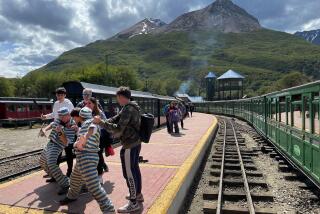G. Suarez Mason, 81; Ex-General Linked to Argentina’s ‘Dirty War’
- Share via
Guillermo Suarez Mason, a retired general once dubbed the “Adolf Eichmann of Argentina” for his role in kidnapping, torture and other human rights violations during his country’s so-called dirty war, died Tuesday. He was 81.
Suarez Mason died in the Central Military Hospital in Buenos Aires of cardiac arrest, his lawyer told the news agency Diarios y Noticias. Suarez Mason was taken to the hospital from Buenos Aires’ Devoto prison over the weekend when he complained of abdominal pains.
The retired general had been detained since 1999 as part of an investigation into the illegal adoption of more than 200 children born to women held captive during the Argentine dictatorship from 1976 to 1983.
“I have not done any of this,” Suarez Mason said in protest when the investigation began.
Because he was older than 70, Argentine law permitted him to be placed under house arrest to await the outcome of the inquiry. But he had recently been incarcerated after authorities said he violated terms of his house arrest.
Suarez Mason was commander of Argentina’s First Army Corps from 1976 until 1979 and in charge of the Buenos Aires area at the height of a systematic crackdown on dissent. The period was marked by illegal torture of leftist dissidents and the death or disappearance of at least 12,000 people. Accusers estimated that 5,000 people died under Suarez Mason’s specific command.
After the dictatorship ended, many military officers were tried and imprisoned for life on charges of torture and other abuses, only to be pardoned in 1990 by then-President Carlos Menem.
Suarez Mason escaped immediate arrest by fleeing to the United States. But that put him under the jurisdiction of U.S. courts, and civil rights groups took action.
In 1988, U.S. District Judge Samuel Conti in San Francisco, saying Suarez Mason directed an “enterprise of terror,” ordered him to pay $21 million in damages to a torture victim who had relocated to San Francisco.
Over the next two years, other San Francisco federal judges ordered Suarez Mason to pay $68 million more to five additional families or survivors of the Argentine witch hunt. New York courts issued similar judgments.
Suarez Mason claimed he was destitute and could not pay any of the judgments.
At the request of the post-junta Argentine government, Suarez Mason was arrested in 1987 in Foster City, Calif., and extradited to his homeland in 1988 to face charges on 39 counts of murder. He was never tried and continued to proclaim his innocence. When the blanket pardon was issued, all charges against him were absolved.
During his extradition hearings in San Francisco, however, he did tell a lawyer for the abused dissidents that he had ordered the arrest of Argentine newspaper publisher Jacobo Timerman, who had editorialized against the junta’s anti-Semitic policies.
The publisher spent 29 months in jail and under house arrest before being expelled to Israel. He later published an account of his arrest, interrogation and torture in the book “Prisoner Without a Name, Cell Without a Number.”
Germany, labeling Suarez Mason the “Butcher of Olimpo,” tried to extradite him in 2001 for trial in the 1977 slaying of a German citizen, but Argentina refused to turn him over.
On June 15 the Argentine Supreme Court struck down amnesty laws concerning the military junta, opening the possibility of renewed charges against Suarez Mason and others for abuses against dissidents.
More to Read
Sign up for Essential California
The most important California stories and recommendations in your inbox every morning.
You may occasionally receive promotional content from the Los Angeles Times.













